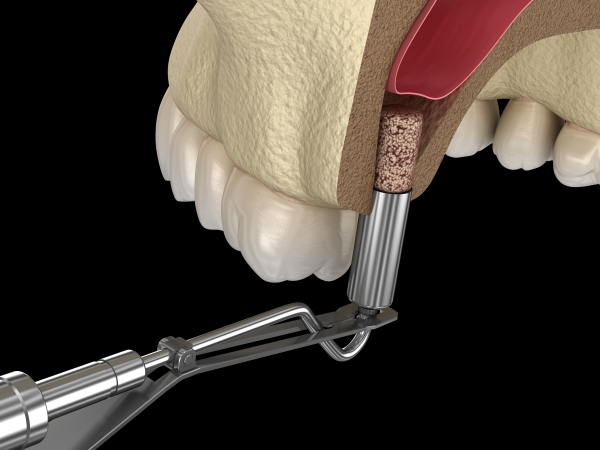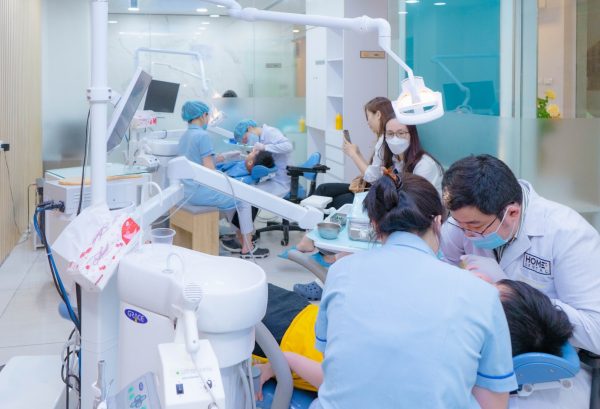Instructions on how to take care of your teeth after dental implants
Taking care of oral hygiene after getting dental implants is extremely important and plays a significant role in the success of the tooth restoration procedure. The dentist or dental care provider will instruct patients on how to properly care for their dental implants during each stage of the recovery process, tailored to their specific needs, in order to minimize the recovery time.
Contents
Danger if you take care of your teeth in the wrong way after the Implant
Improper oral hygiene care by the patient can lead to various dental and gum diseases. Even more dangerous, the dental implant post may become loose, and the recovery process may fail.
Inflammation around the implant post
Peri-implantitis is mainly caused by improper oral hygiene care after dental implant surgery. Bacteria in the mouth attack the surgical site, leading to infection. The dental implant post becomes unstable in the jawbone, and the integration process is prolonged. In severe cases of inflammation, there are signs of implant post-loosening, and the patient may need to undergo treatment to restore and replace the implant post.

Injury to adjacent gum tissue
Damage to the surrounding gum tissue in the area of the implant is a prolonged complication of inflammation around the implant post. Bacteria from the tooth socket can spread to healthy areas of the tooth, causing damage to the tooth roots and weakening them.
Moreover, the condition of gum tissue damage can also result from improper implant placement procedures. Incorrect positioning of the implant by the dentist can cause severe pain and discomfort for patients.
Instructions for dental care after implantation
Taking care of oral hygiene after receiving dental implant surgery is extremely important and greatly affects the success of the restoration of missing teeth. Below are some correct ways to take care of your oral hygiene as instructed by experts:
• Use gauze to control bleeding
• Apply ice to reduce pain and discomfort
• Follow the doctor’s prescription for medication
• Maintain a healthy diet
• Practice proper oral hygiene
• Schedule regular check-ups
Use cotton to stop bleeding
Within the first 24 hours after implant surgery, bleeding from the wound can cause saliva to turn red or pink, causing concern for many patients. To control the bleeding, Ms./Mr. or Ms./Mr. used sterile gauze to apply pressure to the wound for 20-30 minutes.
Cold compress relieves pain
To alleviate the pain, patients use a cold compress to apply on the cheek area surrounding the implant post. The cool temperature from the compress can numb the nerve endings and reduce the sensation of pain. The duration of cold compress therapy depends on the number of implants that have been placed:
- For 1-3 implants, cold compress therapy should be applied for the first 24 hours.
- For 4 or more implants, cold compress therapy should be applied for 48-72 hours after the surgery.
Use the medication as directed
Patients need to adhere to the dentist’s instructions regarding the use of painkillers and antibiotics. It is important to ensure the correct dosage and timing of medication to ensure the best effectiveness and prevent any potential side effects.
Healthy eating mode
In the first 24 hours after implant surgery, it is important for patients to drink plenty of water to help clean the mouth. During this time, patients should only eat soft, well-cooked foods such as porridge, soup, and other mild dishes. Spicy and greasy foods should be avoided until the wound has healed.
Proper cleaning
Proper oral hygiene is essential to avoid affecting the wound. In the first week after surgery, patients should use a soft-bristled brush and a small piece of gauze to clean the area around the implant, as well as dental floss to clean between teeth. Finally, use mouthwash to clean the entire mouth. During this time, patients should avoid using the brush too hard in the implant area, as it can cause damage and increase the risk of infection.
Periodic check-up
Regular check-ups are also important. Patients should closely monitor the implant area and notify the dentist immediately if they experience prolonged pain or excessive bleeding. Patients must attend follow-up appointments at the dental clinic as scheduled by the dentist. At these appointments, the dentist will examine the healing process, perform oral hygiene procedures, and detect any abnormalities in the implant area.
How to take care of teeth after sinus lift, bone grafting in Implant teeth
Bone grafting and sinus lift are surgical procedures aimed at ensuring the quality and volume of the jawbone before implant placement. In cases where patients experience bone loss in the jaw or sinus, bone grafting, and sinus lift are necessary before implant placement. Here are some additional considerations for patients undergoing these procedures:
Case of sinus lift
After sinus lift surgery, it is important for patients to follow the doctor’s instructions carefully:
• Use prescribed pain medication to reduce discomfort and improve sleep quality.
• Rest moderately and avoid staying up late. While sleeping, avoid lying on the side of the lifted sinus to prevent damage to the surgical site.
• Avoid strenuous activities and protect the facial area from external impacts to promote proper healing of the jawbone.
• During the recovery period, patients should avoid swimming or flying as changes in pressure may cause the wound to rupture. Prolonged car rides should also be avoided.
• In the first week, patients should stick to soft foods and avoid acidic foods that can cause infection.
• Most importantly, patients should refrain from smoking or drinking alcohol, as stimulants may delay or even hinder the healing process.

Case of bone graft
For those who have undergone bone graft surgery, dental care should be done as follows to promote rapid wound healing:
• One hour after surgery, absolutely no biting, chewing, or mouth rinsing.
• In the first 24 hours, patients should limit movement, and if they need to move, it should be done gently, without any strenuous physical activity.
• Ice packs or cold compresses can be applied to the outer cheek area to reduce immediate pain.
• If bleeding occurs, sterile gauze or cotton should be used to apply pressure to the wound. If the bleeding does not stop, the patient should contact the doctor for timely examination and treatment.
• Patients should strictly follow the doctor’s instructions for medication and avoid taking any additional medication without the doctor’s permission.
• Absolutely no stimulants such as tobacco, alcohol, or coffee should be used for at least the first week to promote rapid wound healing.
Caring for Implant teeth after attaching porcelain crowns
Attaching the dental crown is the final step in completing the Implant restoration process. Proper care during this stage by following these guidelines will ensure a strong, healthy, and long-lasting set of teeth for the patient.
On the first day after attaching the dental crown to the Implant, patients should only eat soft foods and avoid biting or chewing forcefully to allow the tooth to acclimate to the chewing pressure. After 3-5 days, patients can resume normal eating but still should avoid hard and chewy foods.
Patients should brush their teeth at least twice a day using a soft-bristled toothbrush, floss, and water picks to remove any plaque and food debris between teeth and gums, reducing the risk of oral health issues.
In the first week after attaching the dental crown, patients should avoid smoking to reduce the risk of inflammation around the Implant and even implant failure. Additionally, regular dental checkups every 3-6 months are essential to monitor the restoration process and treat any signs of abnormality.
Home Dental Clinic contact information

To learn more about the Implant tooth replacement method, please contact Home Dental Clinic: the first dental clinic in Vietnam specialized in Implant tooth replacement for middle-aged people.
